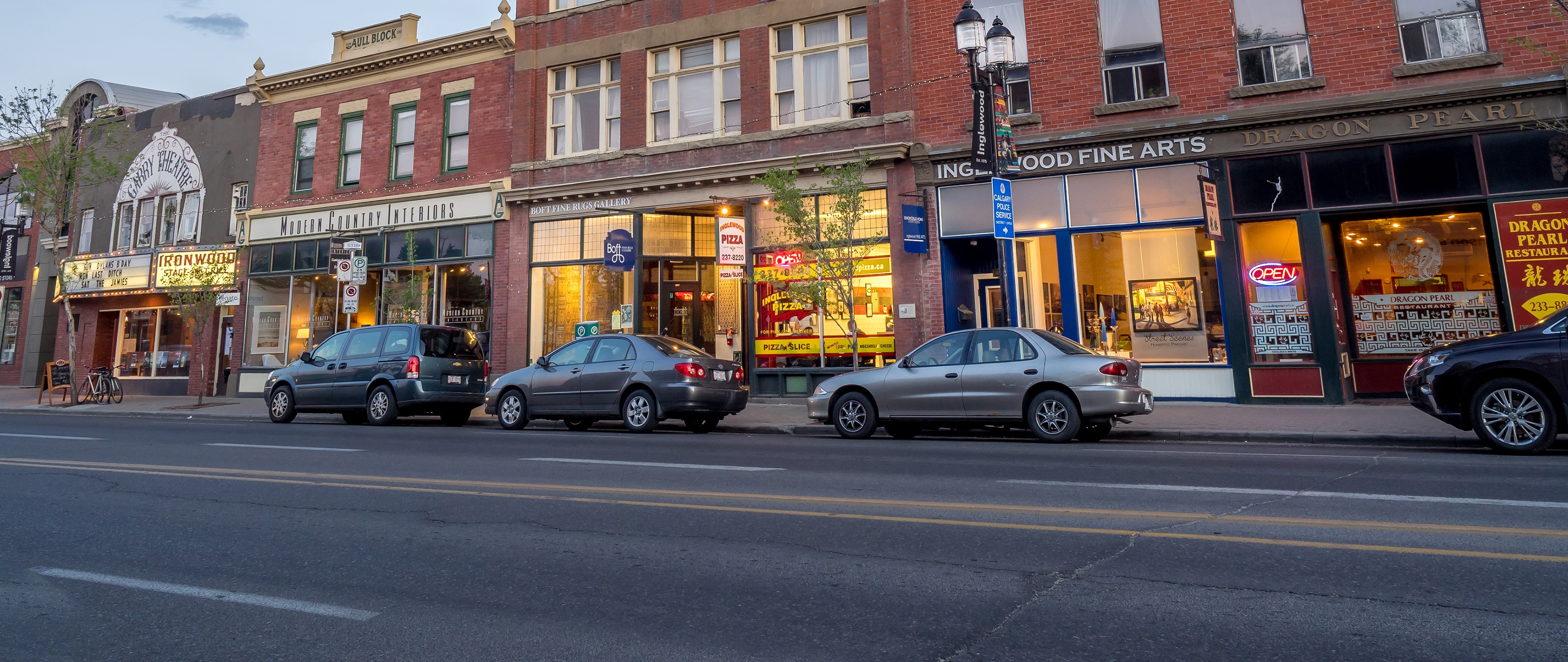Opening a business in Calgary
This page provides general information on what you need to open a business in Calgary.
Register your business
All businesses operating in Calgary are required to register their business with The City of Calgary and get location approval for their business location.
- Business licences are required depending on your activity, to promote individual and public safety.
- Businesses regulated by a Provincial or Federal oversight body typically do not need a licence, for example: accountants, lawyers, doctors.
Before you apply
Where will your business be located?
- Home-based – business is run from your home
- Commercial – business is run out of a commercial space
- Non-resident – you live in a different city or town, and you do business in Calgary
- Mobile – business is on the move. You still need a base of operations for these types of businesses, whether it be your home or a commercial space.
Learn more about location approvals
Who will own the business?
- Sole proprietor – one person owns the business
- Partnership – agreement between two or more people or companies
- Corporation – a legal entity that is separate from its owners, the shareholders
What kind of business do you want to run?
- Do you have a clear idea of exactly what kind of service, product, or facility you would like to operate?
Learn more about business licence types
How to apply for a business licence online
- Create a myID personal account to start the application process.
Register at MyID personal accounts - Go to calgary.ca and click on “Start a New Business”
- Enter your myID personal login information and start your application.
- Submit your application.
Timelines and fees
The timelines for approval of a business licence or registration can vary significantly depending on the permits and approvals that are required for your business type and location.
Know your requirements before signing a lease.
Additional Resources
- Business Improvement Area (BIA) Tax
- Business License Map
- Business link
- Calgary Economic Development
- Service Alberta business services
- Business Development Bank of Canada advisory services for business
- Bizpal.ca
- Alberta Gaming, Liquor and Cannabis(AGLC)
- Alberta Health Services(AHS)
- Alberta Motor Vehicle Industry Council (AMVIC)
City of Calgary Bylaws
Why do you need a business licence?
The City of Calgary has a responsibility to ensure businesses operating within Calgary are registered or licensed municipally. This is to ensure proper regulations and safety rules are being followed, that businesses are located appropriately and to ensure all businesses are treated fairly.
To regulate business activities within the City, bylaws define what businesses need to be licensed, what types of approvals they require and how they will be inspected to ensure the rules are followed. This provides customer protection and ensures that businesses are held to a fair operating standard.
Do you need to register your business name?
A business name, or trade name, is used to represent your business to the public. Trade names can be registered at any Alberta registry.
You’re not required to register a trade name for a municipal licence, but you may need it to open a bank account in your company name. Corporations and registered partnerships will automatically register a tradename when they register the corporation or partnership with the Province.
While a trade name registration does not grant ownership of the name, it gives proof that the name you chose is associated with your business.
NOTE: customers who register a new business will automatically have a myID business administrator account created as part of the application process.
Video tutorial - How to apply for a business licence.
-
The Business Map helps citizens and business owners locate active business licenses near their current location, another address or within a community, and allows users to search by specific licence types.
-
Business Experience file managers help people through the process of applying for and receiving a business licence. They review the initial application and make sure all the right permits are applied for.
Where will your business operate?
Choosing where you will operate is a key step in starting a business in Calgary.
Every business in Calgary requires confirmation of location approval before being approved to open and operate. Certain types of businesses are only allowed to operate in certain areas, so it is important to know how your business will be operating and then choose an appropriate location.
How to get your Location Approvals
Choose which type of location you plan to operate from to read more about the location approvals you might need.

-
Your business will be run from a commercial or industrial location in Calgary
-
Your business will be run from your home in Calgary
-
Your business will be based outside Calgary, but you will be conducting business within the city
Understanding what approvals will be required will help ensure you will be able to open your business with ease and on time. Your business may require Planning Approval or Building Safety Approval, or both in order to be approved to operate from your selected location.
These approvals are based on:
- the location of the business
- the proposed business activities
- how the space was used before your business
-
Opening a Commercial-Based Business
March 21, 2023Hear from the Development, Business & Building Services team about land use approval, permits, fees, and timelines to get your business approved and open sooner.
Planning and Building Safety approvals
What is planning approval?
Part of your location approval confirms that your business is allowed to operate from your chosen location. The Land Use Bylaw specifies a list of allowable uses for each land use district based on what the intent is for that location, which will be listed as either permitted or discretionary. If the use is not listed in a land use district, the business will not be allowed to operate from that location.
Permitted or Discretionary? What’s the difference?
In the Land Use Bylaw, ”uses” are defined as either being Permitted or Discretionary in a Land Use District. Below are definitions for each term.
Permitted means that, if a “use” meets all the rules of the bylaw, it must be approved. The uses listed as permitted were intended for this location and have little to no impact on the surrounding community.
Permitted with Relaxation means a “use” that is permitted but requires a relaxation of one of more bylaw rules. Evaluations are done on a case-by-case basis to determine if the relaxation is appropriate and how it impacts the surrounding community.
Discretionaryuse means that the “use” needs to be reviewed and is evaluated against several factors including applicable policies, appropriateness of the location, the compatibility of the “use” with others in the surrounding area, access, parking, servicing, and sound planning principles. Each submission is reviewed on its own merit at the time of application as discretionary “uses” have a higher impact on the surrounding community.
How your business operates will determine what use or uses best fit your business. Types of planning approval include Tenancy Change, Permitted Change of Use, Permitted with Relaxation Change of Use, and Discretionary Change of Use.
What is building safety approval?
Your business will also be reviewed for safe operations. Based on how the commercial building is constructed and the types of tenants it is designed for, a building will have a classification and occupancy based on the National Building Code – Alberta Edition.
Even if you are not planning any construction or changes to the space, the change in business activities may require a building permit application to review the safety of the space and bring it into compliance with the National Building Code – Alberta Edition. If required, you will need to apply for a Building Permit.
TIP
Before you lease a space, it’s important to determine if the use or uses are listed at a proposed business location, if a use isn’t listed in a land use district, it’s not allowed in that district.
If a use is not listed, you could apply for a Land Use Redesignation, or look for another location for your business.
Look up your land use district on the listed use matrix to determine if your proposed business activities are listed in your district.
How will you occupy the space?
Once you’ve confirmed your business activities are a listed use in a Land Use District, you need to determine how you will be occupying the space, to see which permits you might need to satisfy your Location Approval.
Contact the Planning Services Centre if you are not sure what approvals your business will require from your chosen location.
-
There was a different business using this space and now your business will be taking over, OR you are a new tenant, but you will be sharing the space with an existing tenant
-
You are the first tenant going into a unit in a new building.
-
You are an existing tenant. You have pre-existing approval for this space, but are making changes to operations
You are taking over a previously occupied space
There was a different business using this space and now your business will be taking over, OR you are a new tenant, but you will be sharing the space with an existing tenant.
You will need one or more of the following:
- Tenancy Change: how the space is used is not changing, but the tenant is changing or taking over the existing business with no changes. For example: Retail to Retail. No construction is being done.
- New: A Tenancy Change may also be required if only the use of the space is changing and that use is listed as a permitted in the following districts: C-N1, C-N2, C-C1, C-C2, C-COR1, C-COR2, C-COR3, C-O, C-R1, C-R2, C-R3, CC-MHX, CC-X, CC-COR, CR20-C20/R20, CC-ET, CC-EIR, CC-EMU, CC-EPR, CC-ERR, CC-ER, MU-1 and MU-2, I-B, I-C or I-G. If there are other changes to the space, a development permit may still be required.
- New: A Tenancy Change may also be required if only the use of the space is changing and that use is listed as a permitted in the following districts: C-N1, C-N2, C-C1, C-C2, C-COR1, C-COR2, C-COR3, C-O, C-R1, C-R2, C-R3, CC-MHX, CC-X, CC-COR, CR20-C20/R20, CC-ET, CC-EIR, CC-EMU, CC-EPR, CC-ERR, CC-ER, MU-1 and MU-2, I-B, I-C or I-G. If there are other changes to the space, a development permit may still be required.
- Development Permit: use of the space is changing, for example: Retail to Restaurant. However, you may only need a Tenancy Change if how you will be using the space is listed as permitted in one of the following districts: C-N1, C-N2, C-C1, C-C2, C-COR1, C-COR2, C-COR3, C-O, C-R1, C-R2, C-R3, CC-MHX, CC-X, CC-COR, CR20-C20/R20, CC-ET, CC-EIR, CC-EMU, CC-EPR, CC-ERR, CC-ER, MU-1 and MU-2, I-B, I-C or I-G districts.
- Building Permit: you will be doing construction, or the space needs to be reviewed for safety and be brought into compliance with the National Building Code – Alberta Edition.
- Trade Permits: may be required if plumbing, electrical or HVAC work is required.
This is a new building, and you will be the first tenant in the space
If you are the first tenant going into a unit in a new building you will need:
- Building Permit: new buildings will have approval for the base building. A building permit is required for the individual tenant fittings needed to complete the space.
Trade Permits: are needed for plumbing, electrical or HVAC work within your individual unit.
You may need:
- Development Permit: new building owners will get approval for the base building and new businesses often require a separate development permit for their business.
You are currently occupying the space and changing your business activities
You are an existing tenant. You have pre-existing approval for this space, but are making changes to operations
You may need one or more of the following:
- Tenancy Change: to confirm if the proposed new business activities will match the existing approvals.
- Development Permit: if you’re changing the way the space is being used, you may need a Development Permit.
- Building Permit: if you will be doing construction, or the changes require a building safety review to confirm compliance with the National Building Code – Alberta Edition.
- Trade Permits: may be required if plumbing, electrical or HVAC work is being done or is required to satisfy Safety Code Requirements.
Contact the Planning Services Centre if you are unsure if the changes in operations will require new approvals.
What different types of permits might be required?
Development Permit
You may need a development permit to operate from your preferred location if your proposed business activities do not match the current approved use. This is called a change of use development permit. You may need a development permit for other reasons, including some exterior and interior changes to the space.
Sometimes, even if your business is listed as permitted, your business activities require a relaxation to the bylaw rules. This is considered permitted with relaxation change of use and takes longer to process than a permitted change of use.
Contact the Planning Services Centre if you are unsure if the changes in operations will require new approvals.
How to apply
You can apply for your Change of Use Development Permit before, at the same time as, or after your business licence (Licence) application. We recommend applying before your Licence.
Checklists
Sample drawings
Review the sample drawings to help prepare your application.
Fees, timelines and expiry
| Permit Type | Fee schedule | Permit fee | Advertising fee | Total | Our Process | Timeline | Expiry |
|---|---|---|---|---|---|---|---|
|
Permitted Change of Use |
$190 |
- |
$190 |
- |
5
business days |
1-3
years to commence depending on the type of development permit and land use
district |
|
|
Permitted with Relaxation or Discretionary Change of Use |
$594 |
$30 |
$624 |
60 days
to decision + 21 days advertisement/appeal period *timelines
are subject to change based on circulation requirements |
10-12
weeks |
1-3 years to commence depending on the type of development permit and land use district |
*Review our Development Permit Process page for more information about the planning approval process.
To avoid delays, make sure your application includes all the required documents, plans and information as indicated on the checklist.
Contact the Planning Services Center to determine the current approved "use" for your proposed address.
Tenancy Change
Contact the Planning Services Centre to determine the current approved ‘use’ for your proposed address.
If your business activities fall under the same ‘use’, typically a Tenancy Change application is required. In some Land Use Districts, a Tenancy Change is required if the use is listed as permitted in the district. These land use districts include: C-N1, C-N2, C-C1, C-C2, C-COR1, C-COR2, C-COR3, C-O, C-R1, C-R2, C-R3, CC-MHX, CC-X, CC-COR, CR20-C20/R20, CC-ET, CC-EIR, CC-EMU, CC-EPR, CC-ERR, CC-ER, MU-1 and MU-2, I-B, I-C or I-G districts. If there are other changes to the space, a development permit may still be required.
Please note, during this review, we may determine a Development Permit and/or a Building Permit is required instead or in addition to the Tenancy Change application.
How to apply
If a Tenancy Change application is required, you can apply for it at the same time as a new business licence application or building permit, apply online or in person at the Planning Services Centre.
Step 1
Step 1
Access the website
- Visit apply.calgary.ca
- Select the “Start New Business Licence and/or Land Use Approval” tile. (This launches both new-licence and land-use workflows.)
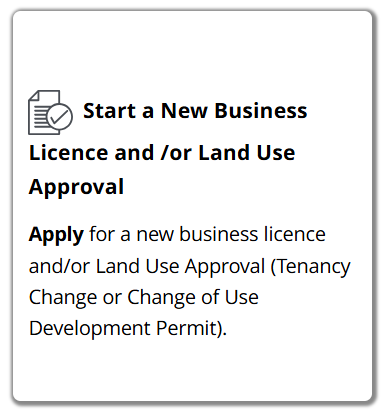
Step 2
Step 2
Log in or register your Calgary Business Account
- Sign in with your myID, or click “Register New Business Account” to create one.
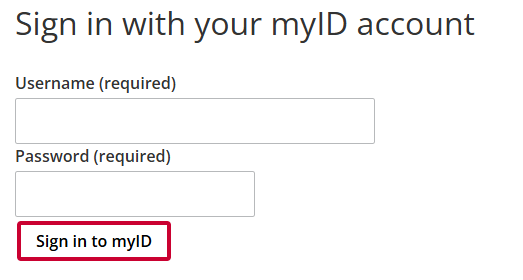
Step 3
Step 3
Initiate the “Approvals Required” workflow by filling out the application until you reach step 7
On the approvals summary page, click Yes – apply now.
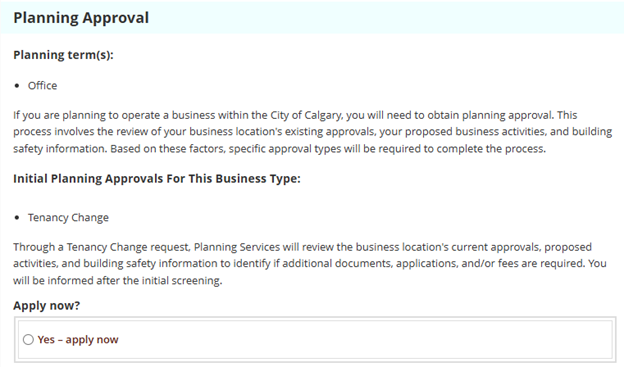
Step 4
Step 4
Enter applicant and business details
- Applicant’s name, contact info and role
- Business legal name, address, operating hours
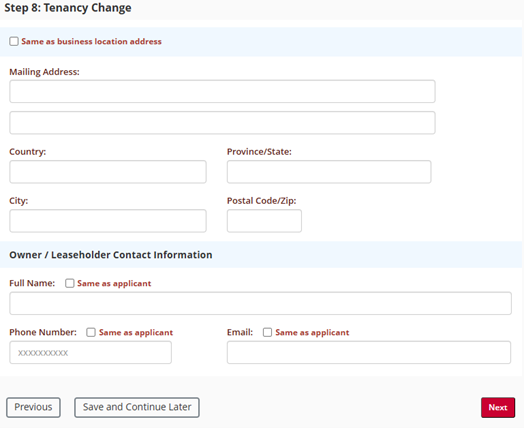
Step 5
Step 5
Provide a description of the proposed use
- Short narrative of activities and occupancy
Step 6
Step 6
Upload required attachments.
Note: Not all listed document types are required for all applications
- Signed lease or letter of intent
- Site plan (unit location)
- Interior floor plan (if changed)
- Specialist reports (fire safety, accessibility, etc.)
- Use questionnaire
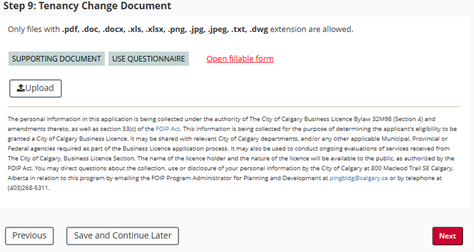
Step 7
Step 7
Review and accept declarations
- Read the City’s standard applicant declaration
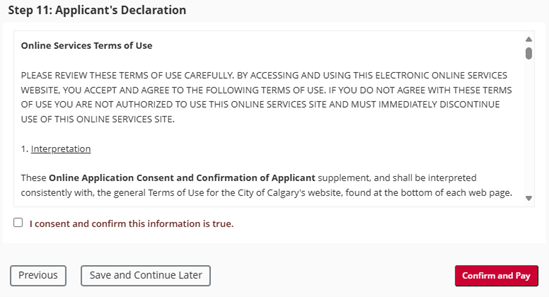
Steps 8 and 9
Steps 8 and 9
Pay all applicable fees
- Portal auto-calculates licence and land-use fees
- Pay by credit card and download your receipt
Submit the application
- Click Submit to send for review
| Permit Type | Fee schedule | Total | Timeline |
|---|---|---|---|
|
Tenancy Change |
Planning applications fee schedule
|
$0 |
Approximately
10 business days |
Building Permit
A building permit will be required if you are making changes to your space, including adding, moving, or removing wall partitions. Even if you are not proposing any construction, you might still need a building permit to confirm that the space meets the required Safety Codes. Upgrades to the space may be necessary to bring it into compliance with the National Building Code - Alberta Edition and all applicable health and safety standards. A building permit confirms that your space is safe to operate your business from.
How to apply
You can apply before, at the same time as, or after your business licence application. You can submit Building permit details and drawings online or in person at the Planning Services Centre.
Checklists
For more information about your business activity and the associated building permit code classification, visit Alberta Building Code for commercial building permits. For more information about when a building permit is typically required, visit Calgary.ca/commercial or contact the Planning Services Centre.
Fees, Timelines and Expiry
| Permit Type | Fee schedule | Permit fee | Total | Timeline | Expiry (from date of issuance) |
|---|---|---|---|---|---|
|
Commercial
building permit |
Varies |
Please use the Building permit fee calculator to estimate your fee. |
Varies based on complexity | 180 days until you require a progress inspection |
Trade Permits
You may require a trade permit if you are doing any upgrades or new in a specific trade. This can include required upgrades to the existing HVAC system in the building, changes or upgrades to plumbing, electrical and gas systems. A trade permit confirms that the work being done complies with the appropriate safety codes.
Commercial Trade Permit applications must be done by the appropriate licensed Trade Contractor. Visit Hiring a Contractor for information on what to look for when choosing a contractor.
Home Based Location
Your business will be run from your home in Calgary. You may have a desk/telephone operation, complete your paperwork at home, or you may have customers coming to your home to be considered a home based business.
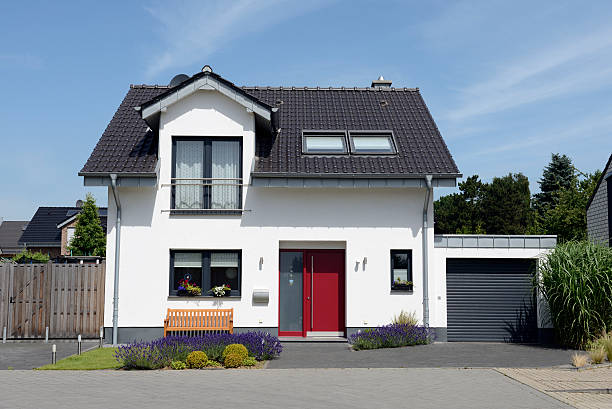
If you want to run your business from your home, you will need to decide on how your business will operate out of your home.
If you meet the rules of a home occupation class 1, this approval will be automatically granted when you apply for your business licence. It is valid until your business is no longer operating from your home.
If your business does not meet all the home occupation class 1 rules, you will need to apply for a home occupation class 2 development permit. This can be done before, at the same time, or after your business licence application. *
The table below will help you determine if you qualify for a home occupation class 1 or if you will need to make an application for a home occupation class 2. A home occupation class 2 development permit does not guarantee an approval.
| Home occupation class 1 | Home occupation class 2 | |
|---|---|---|
| You live in the home associated with the business: | Yes | Yes |
| The number of business related visits to your home per week: | 0 - 3 max. | 4 - 15 |
| The garage or related structure is used for the business: Note, a small storage area that is not impacting parking may be allowed for either. | No | Yes |
| A large vehicle (over 4,536 kg gross vehicle weight) is parked/stored at or near the home: | No | Yes |
| Employee or business partner working at your home (that does not also live there): | 0 | 1 |
| Your business is food-related, and you are using a kitchen in your home: | No | Yes |
*This table is for convenience only and does not include everything listed in our Land Use Bylaw. Please review the full list of rules located in the Land Use Bylaw section 207 “Home Occupation – Class 1” and section 208 “Home Occupation – Class 2.”
Fees, Timelines & Expiry
| Location approval | Fee schedule | Permit fee | Advertising fee | Total | Timeline | Expiry |
|---|---|---|---|---|---|---|
| Home occupation class 1 | - | - | $0 | 5 business days | No expiry | |
| Home occupation class 2 | $449 | $32 | $481 | Approximately 10-12 weeks | Varies, refer to your permit's conditions of approval for the expiration |
Building permit (if applicable)
Some home-based business activities may also require a commercial building permit for your space to comply with the National Building Code – Alberta Edition and all applicable health and safety standards. For example, you will need a Building Permit for a separate kitchen for your baking business.
Building permit details and drawings can be submitted online or in person at the Planning Services Centre.
For more information on specific application types please see the corresponding checklist below.
Fees, Timelines & Expiry
| Fee schedule | Permit fee | Total | Timelines | Expiry (from date of issuance) | |
|---|---|---|---|---|---|
| Commercial building permit | Varies |
Please use the Building permit fee calculator to estimate your fee. |
Approximately 21 business days* | 180 days until you require a progress inspection |
*Please see our Timelines Page for up-to-date timeline information
For more information about when a building permit is typically required, visit Calgary.ca/commercial or contact the Planning Services Centre.
Based out of town
Your business is based outside of the City of Calgary. Location approval is not required from the City of Calgary, but it is recommended that you check with the municipality or county in which you will be basing your operations for their requirements.
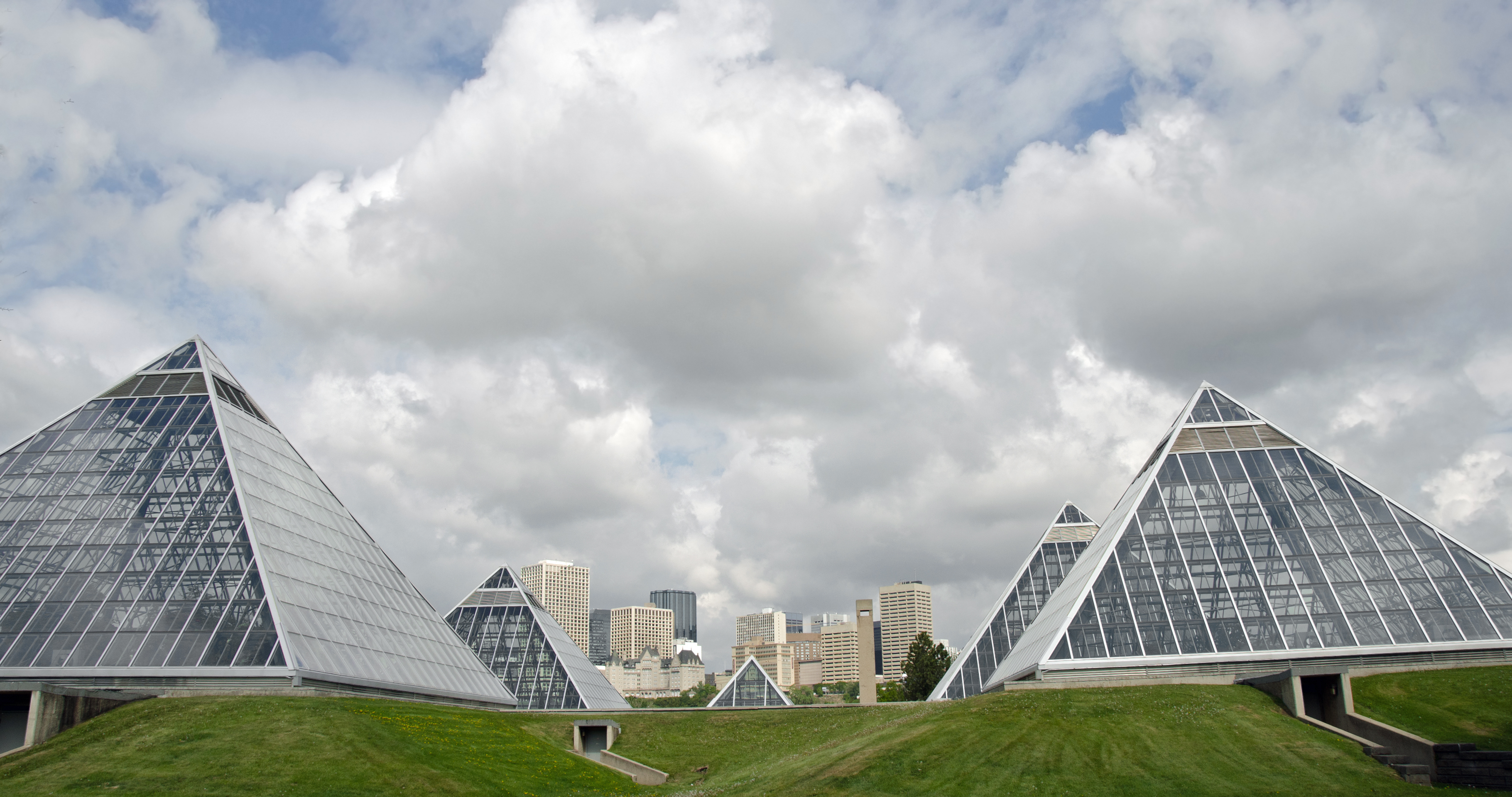
Your business is based outside of Calgary city limits. Location approval is not required from The City of Calgary, but it is recommended that you check with the municipality or county in which your operations will be based for their requirements.
If your business will be based outside of Calgary city limits, but you will be conducting business within Calgary, your business is considered ‘non-resident’. Non-resident businesses are required to pay an additional non-resident surcharge on top of standard licensing fees.
If you own commercial or residential property within Calgary, the non-resident surcharge may be waived. Contact the Planning Services Centre for more information.
What are other things to consider?
Federal taxes, provincial taxes and GST
Whether your business is a sole proprietorship, a partnership or a corporation, you need to pay taxes on your profits. A bookkeeper or accountant will be the best source of information on the tax process. Find out more information on provincial taxes.
For federal tax information, visit the Canada Revenue Agency.
GST for businesses
The Canada Revenue Agency determines whether you need to collect GST. If you are required to collect GST, you need to register an account with the Canada Revenue Agency to receive your GST number.
Business improvement area (BIA) tax
Business Improvement Area (BIA) tax is billed annually to any business that occupies commercial space within an established Business Improvement Area (BIA) in Calgary. It does not reflect a specific type of business or the profit of a business.
For more information on the administration or collection of business improvement area (BIA) and property taxes, visit Business Improvement Area (BIA) Tax or contact 311.
Planning Services Centre
Hours:
Monday - Friday
8 a.m. - 4 p.m. (MT)
Live chat:
calgary.ca/livechat
Call:
403-268-5311
In person:
Planning Services Centre,
3rd floor, Municipal building
800 Macleod Trail SE
Book an eAppointment for in person services at appointment.calgary.ca
Please note: The Property Research Counter will be temporarily closed from
8:00 - 9 a.m. (MT) on the first Tuesday of each month.


